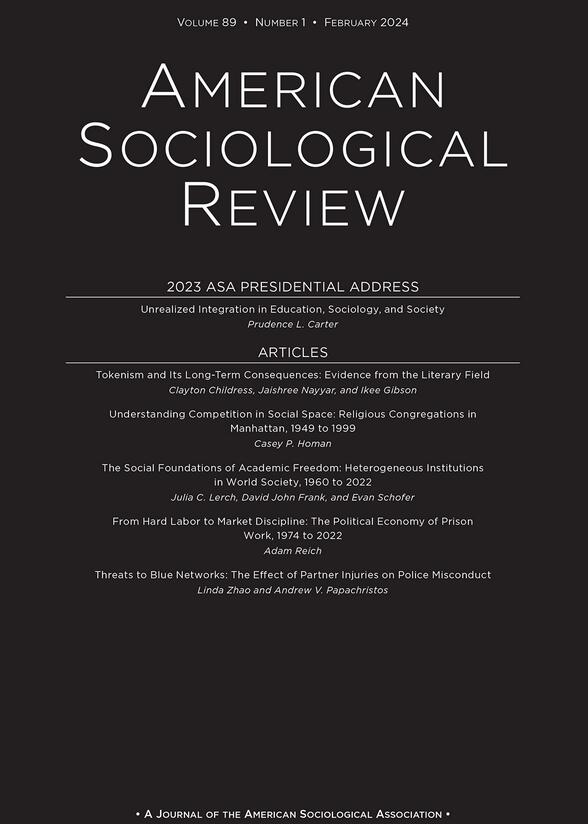价值观与不平等:亲社会工作与大学工资溢价
IF 6.2
1区 社会学
Q1 SOCIOLOGY
引用次数: 9
摘要
雇主通常通过援引企业社会责任、组织目的或其他亲社会使命来招聘员工。在劳动力市场严重不平等的时代,评论家们通常认为这些说法是虚伪的:亲社会的雇主往往对低工资工人并不比其他雇主更慷慨。在这篇文章中,我们认为亲社会承诺实际上无意中减少了收入不平等,但通过的渠道与慷慨不同。基于对工作价值观的研究,我们假设大学毕业生比非大学毕业生更愿意为亲社会影响而牺牲薪酬。当雇主诉诸亲社会价值观时,他们可能会不成比例地降低受过高等教育的工人的工资。我们用美国网上招聘的数据来检验这一理论。我们发现,要求大学学历的亲社会职位的薪酬低于要求完全相同的标准职位;然而,不需要大学学历的亲社会工作的薪酬与其他低学历工作没有什么不同。这一差距使大学工资溢价总额减少了约5%。我们使用劳动力市场数据、工人调查回应和招聘经理的小插曲实验提供了各种补充证据。研究结果揭示了雇主接受亲社会价值观的一个意想不到的后果:它抵消了宏观层面的不平等。本文章由计算机程序翻译,如有差异,请以英文原文为准。
Values and Inequality: Prosocial Jobs and the College Wage Premium
Employers often recruit workers by invoking corporate social responsibility, organizational purpose, or other claims to a prosocial mission. In an era of substantial labor market inequality, commentators typically dismiss these claims as hypocritical: prosocial employers often turn out to be no more generous with low-wage workers than are other employers. In this article, we argue that prosocial commitments in fact inadvertently reduce earnings inequality, but through a different channel than generosity. Building on research on job values, we hypothesize that college graduates are more willing than nongraduates to sacrifice pay for prosocial impact. When employers appeal to prosocial values, they can thus disproportionately reduce pay for higher-educated workers. We test this theory with data on online U.S. job postings. We find that prosocial jobs requiring a college degree post lower pay than do standard postings with exactly the same job requirements; prosocial jobs that do not require a college degree, however, pay no differently from other low-education jobs. This gap reduces the aggregate college wage premium by around 5 percent. We present a variety of supplementary evidence using labor market data, worker survey responses, and a vignette experiment with hiring managers. The findings reveal an unintended consequence of employers’ embrace of prosocial values: it offsets macro-level inequality.
求助全文
通过发布文献求助,成功后即可免费获取论文全文。
去求助
来源期刊

American Sociological Review
SOCIOLOGY-
CiteScore
13.30
自引率
3.30%
发文量
35
期刊介绍:
The American Sociological Association (ASA) is a non-profit membership association established in 1905. Its mission is to advance sociology as a scientific discipline and profession that serves the public good. ASA is comprised of approximately 12,000 members including faculty members, researchers, practitioners, and students in the field of sociology. Roughly 20% of the members work in government, business, or non-profit organizations.
One of ASA's primary endeavors is the publication and dissemination of important sociological research. To this end, they founded the American Sociological Review (ASR) in 1936. ASR is the flagship journal of the association and publishes original works that are of general interest and contribute to the advancement of sociology. The journal seeks to publish new theoretical developments, research results that enhance our understanding of fundamental social processes, and significant methodological innovations. ASR welcomes submissions from all areas of sociology, placing an emphasis on exceptional quality.
Aside from ASR, ASA also publishes 14 professional journals and magazines. Additionally, they organize an annual meeting that attracts over 6,000 participants. ASA's membership consists of scholars, professionals, and students dedicated to the study and application of sociology in various domains of society.
 求助内容:
求助内容: 应助结果提醒方式:
应助结果提醒方式:


